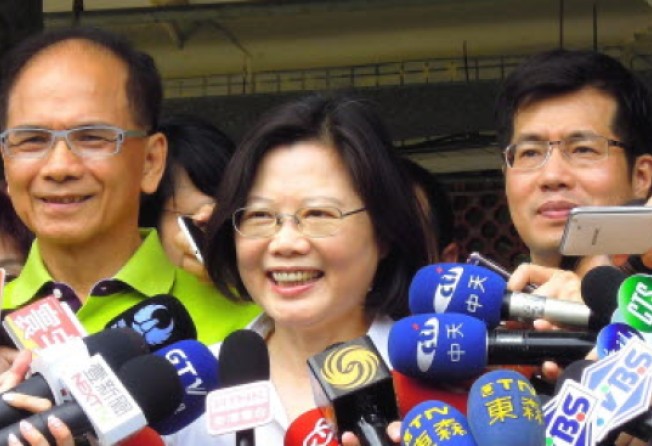Tsai Ing-wen's likely victory in Taiwan means cross-strait pragmatism needed
Bonnie Glaser and Jacqueline Vitello say Xi Jinping's tough stance on Taiwan could stoke political fires again if the DPP leader becomes president, despite her status quo pledge

Taiwan's presidential election is six months away, but it seems increasingly likely that Tsai Ing-wen of the Democratic Progressive Party will win. Among those watching the possible return of the DPP to power is the central government, which worries that, if elected, Tsai will deny that the two sides of the strait belong to one China and pursue de jure independence.
This fear derives from Tsai's history as the creator of the "two states theory" in the Lee Teng-hui era as well as her unwillingness to accept the existence of "one China" even as she pledges to maintain the status quo across the Taiwan Strait.
Beijing could react harshly if Tsai is elected. It could take punitive economic measures, suspend communication and cooperation mechanisms, steal away some of Taiwan's diplomatic allies, or even use military coercion or force.
President Xi Jinping's reaction to a Tsai victory should not be underestimated. When it comes to sovereignty issues, the Chinese leader has shown little willingness to compromise. Since taking power in 2012, Xi has sent tough signals to Taiwan, and these warnings have intensified in the run-up to the elections.
In the aftermath of the Sunflower Movement by students in Taiwan and the Umbrella Movement in Hong Kong, with the popularity ratings of both President Ma Ying-jeou and his Kuomintang dwindling ahead of the upcoming presidential elections, Xi spoke on the "Taiwan question" in March.
Addressing a panel discussion with members of the 12th National Committee of the Chinese People's Political Consultative Conference, Xi expressed his strong distaste for "the separatist forces of 'Taiwanese independence' and their activities", which he claimed "threaten national sovereignty and territorial integrity".
Then in May, Xi met with new KMT chairman Eric Chu, and again delivered a tough message. According to Xinhua, Xi insisted that opposition to Taiwanese independence, along with firm adherence to the 1992 Consensus, forms the "political foundation for cross-strait relations".
Complementing Xi's stern cross-strait messages, the People's Liberation Army has conducted military exercises near Taiwan. The most recent drills took place in late May and early June, which coincided with a visit Tsai made to the US.
Since assuming power, Xi's approach to Taiwan has been consistently hardline and, at times, remarkably at odds with the sentiment of most Taiwanese people. There are several possible explanations.
It may be that Xi's target audience is not Taiwan but the mainland. He may be determined to not appear weak on Taiwan lest it undermine his power and ability to achieve the "Chinese Dream".
It's also possible that Xi may not understand Taiwan as well as many observers say he does.
A third possibility is that Xi has concluded it is time to draw a line in the sand to prevent cross-strait ties from regressing.
There is a significant possibility that if Tsai is elected, a cross-strait crisis could ensue, despite Tsai's stated strategy aimed at maintaining the status quo.
Responsibility for maintaining a stable and cooperative cross-strait relationship lie with both Beijing and Taipei. If Tsai is elected, the two sides will need to agree on a new formulation that provides a basis for managing relations. The interests of both will be best served by a pragmatic approach that takes into account prevailing realities.
Bonnie S. Glaser is a senior adviser for Asia at the Centre for Strategic and International Studies in Washington DC and a Pacific Forum senior associate. Jacqueline Vitello is a research associate and programme coordinator with the Freeman Chair in China Studies at CSIS. Copyright: Pacific News Service